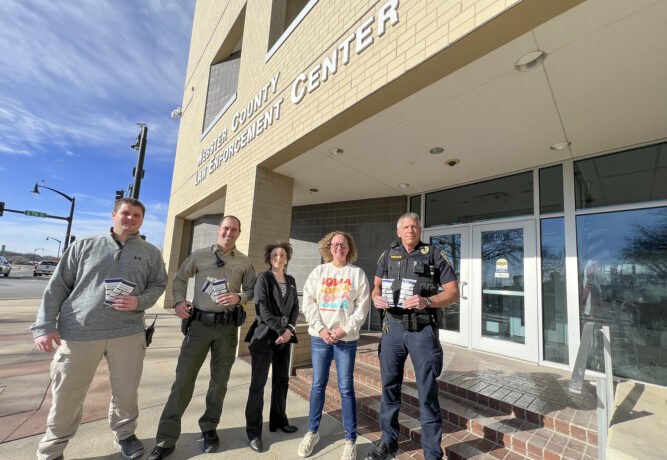-Messenger photo by Kelby Wingert
Webster County Health Department Director Jennifer Sumpter and WCHD staff member Debra Franz delivered 200 fentanyl test strip kits to the Fort Dodge Police Department and Webster County Sheriff’s Office that were purchased using opioid settlement funds. From left are: WCSO Detective Alex Winninger, WCSO Chief Deputy Derek Christie, Franz, Sumpter and FDPD Chief Dennis Quinn.
When the powerful synthetic opioid drug fentanyl started becoming more and more prevalent as a street drug on its own in pill form and mixed with other illegal narcotics in recent years, law enforcement struggled to safely test for the substance when out in the field.
The drug is incredibly dangerous and according to the Drug Enforcement Administration, a deadly dose of fentanyl is just two milligrams.
But now, thanks to funds received by Webster County from several class action settlements against the manufacturers of opioids, the Fort Dodge Police Department and the Webster County Sheriff’s Office can safely test seized drugs for fentanyl without any direct exposure.
On Friday, the two departments received 200 fentanyl test strip kits from the Webster County Board of Health’s Opioid Settlement subcommittee.
“Essentially, we really wanted to focus on our first responders,” said Jen Sumpter, Webster County Health Department director. “We knew that was really important to get some of these tools out there for these guys to use to protect them.”

-Messenger photo by Kelby Wingert
The Fort Dodge Police Department and the Webster County Sheriff’s Office has received 200 MobileDetect fentanyl test strip kits from the Webster County Board of Health using opioid settlement funds.
Fort Dodge Police Chief Dennis Quinn said he appreciates the partnership law enforcement has with the Board of Health’s subcommittee for the opioid funds.
“We all know that there’s been a rise in fentanyl in the U.S. and we know that it’s here,” Quinn said. “We have some cases with it, but obviously there’s a big safety risk when it comes to our officers having to deal with it.”
When fentanyl started to become more prevalent in Fort Dodge, Quinn said, the Police Department tried to develop procedures for officers who have to test drugs to determine what they are.
“It scares us as administrators, something happening to our officers,” he said. “So we came up with different ways of trying to test it in the safest way.”
The test strips are able to test for trace amounts of fentanyl on the drug’s packaging. According to DetectaChem, the company that manufactures the MobileDetect fentanyl test strips, the test strips are highly sensitive and the “most accurate fentanyl test available.”
“This gives us a way safer way to test drugs so we can verify if it is fentanyl,” Quinn said, because officers don’t have to open the package or container that the drugs are in to be able to test them. That eliminates the risk of making the drugs airborne and transfering onto skin.
“It’ll make a huge difference,” he said.
Each box of test strip kits has 10 kits and costs $34.90. In total, the Board of Health purchased 20 boxes for $698.
The opioid settlements are between the various governments and McKesson Corp., Cardinal Health Inc., Amerisource Bergen Corp., Johnson & Johnson, Janssen Pharmaceuticals Inc., Ortho-McNeil-Janssen Pharmaceuticals Inc., and Janssen Pharmceutica Inc. The state of Iowa will receive $345 million in settlement funds over the next decade. Local governments that signed onto the settlement agreements will receive about half of those funds.
Money received as a result of the agreements will be distributed based on population and the impact that opioid addiction has had on individual communities. That impact is measured by things like the number of overdose deaths and the number of residents with substance abuse disorders.
“It’s very unfortunate how this came about, but it’s great that it’s being put back into the community for the safety of opioids,” Webster County Sheriff’s Office Chief Deputy Derek Christie said.














